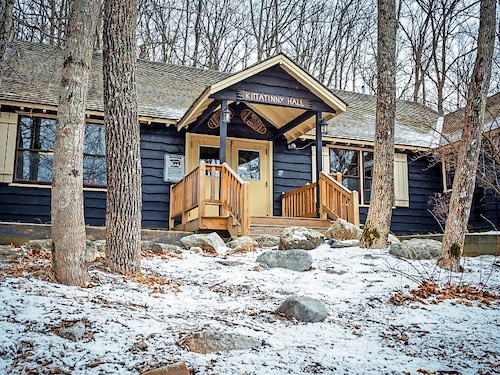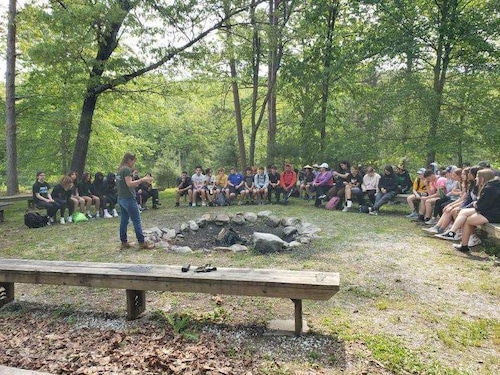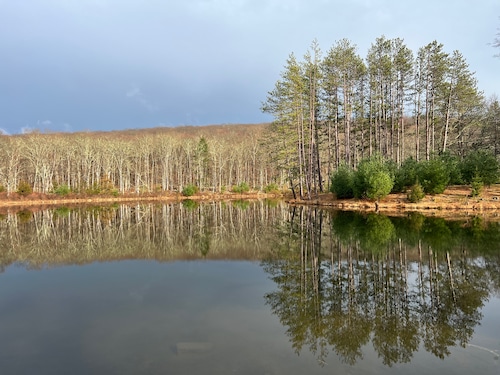The New Jersey School of Conservation has been on a roller coaster for the past four years.
Montclair State University — which had run the beloved environmental school in Stokes State Forest since 1981 — withdrew its support during the pandemic, causing the conservation school to close for almost a year.
Then, the Sussex County school was resurrected by a nonprofit group in 2021, but it faced millions of dollars in dam repair costs to preserve its lake.
Now, after requesting $3 million from the state to fix long-neglected maintenance issues, New Jersey School of Conservation is instead facing a 60% cut under Gov. Phil Murphy’s proposed budget that would shut down its educational programs, its leader said.
Kerry Kirk Pflugh, executive director of the nonprofit Friends of the New Jersey School of Conservation, said the proposed state budget contribution of $800,000 for the upcoming fiscal year would leave the school with only a skeleton crew to keep the buildings from falling down.
“We wouldn’t have the personnel to operate education programs,” she said.
The governor’s office declined to comment on the proposed budget cut to the school.
The school, located on a 240-acre tract of land in Sandyston, teaches environmentalism and conservation. It hosts public school students from around the state who travel to the site for classes. It also offers workshops for teachers.
The school recently hosted school groups from Jersey City, Allentown and Somers Point for overnight programs, officials said.
Friends of the New Jersey School of Conservation is planning to launch a capital campaign at its 75th anniversary celebration June 1, and ultimately aims to raise money for an endowment to support the school long-term, Pflugh said.
The group is also waiting to hear back from the state on the final cost of repairs to the dam of its lake, which is expected to be $1 million to $2 million.

The New Jersey School of Conservation in Stokes State Forest.
Pflugh hopes sympathetic legislators she has met with will back significant funding for the school.
Senator John McKeon, D-Essex, told NJ Advance Media he plans to write a budget resolution to increase funding to the school and garner bipartisan support from both houses of the Legislature. Lawmakers can propose adding money to the state budget, but not all resolutions succeed.
“Wherever you live in the state, this is something that should be supported,” said McKeon, who has advocated for the school for years. “It’s a real jewel. Hopefully, we’ll get there.”
The head of New Jersey’s largest teachers union, the New Jersey Education Association, also spoke of the value of the school to the state’s students and teachers.
“The NJ School of Conservation’s educational programs are valuable for both learning about climate and the environment and for the social and emotional learning they foster,” said NJEA president Sean Spiller.
In written testimony to the legislature, Spiller called the work at the school in the past year “remarkable,” and said teachers found its programs very useful.
“While there is a plan to look for corporate and private donations, without sustained state funding, there is no way to continue the progress to rebuild and stay open,” he wrote. “We hope that in the budget you craft you will see the value of an additional $2 million for the School of Conservation.”
The school’s brief closure during the pandemic came the same year that New Jersey became the first state in the nation to require climate change education. Pflugh noted the school invites young people to work in the field to understand issues around global warming.
“They learn first-hand some impacts of climate change,” she said. “We have invasive species on campus, and they learn about the effects of temperature and the importance of tree cover.”
Students learn about actions they can take back into their own homes to protect the environment.
“We’re a resource, a living, breathing program and facility that can support” climate change education, she said.

Students learn about nature at a class at the New Jersey School of Conservation.courtesy of the New Jersey School of Conservation

Stories by Tina Kelley
Our journalism needs your support. Please subscribe today to NJ.com.
Tina Kelley may be reached at tkelley@njadvancemedia.com.
